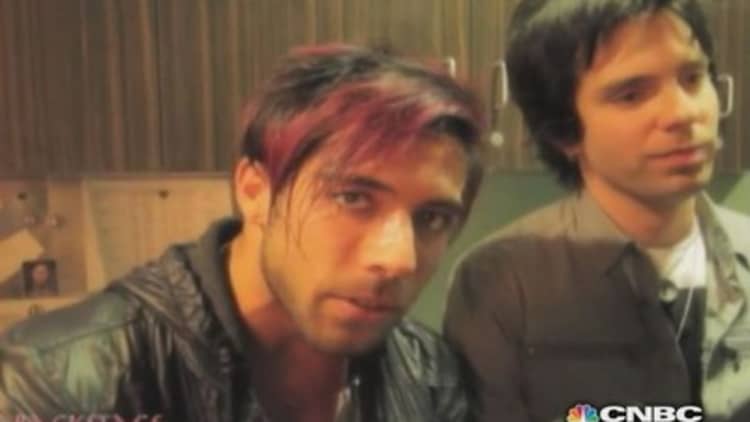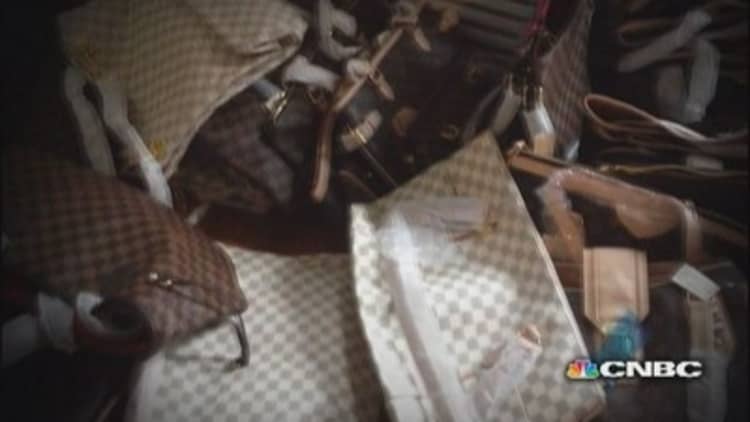
Rob Mawhinney, the lead singer of the band Lights Over Paris, or L.O.P. as it's known, desperately wanted to become an international rockstar. But there was one problem: The world didn't have an appetite for L.O.P.'s music, and the band never made a dent on the charts.
Mawhinney, however, refused to take "no" for an answer and came up with a plan he hoped would propel him and his band to music stardom—or at least afford them the opportunity to live the lives of a rock stars.
Mawhinney walked into Los Angeles branches of four banks—Comerica, Bank of America, JPMorgan Chase and Zions—and asked for millions of dollars in loans. Assistant U.S. Attorney Ranee Katzenstein worked the case for the Central District of California.
"He didn't have any income. There was no money coming into his bank accounts. He couldn't get the loans unless he lied," Katzenstein said. "And that's what he did."
(Read more: CNBC viewers tip off the FBI)
Mawhinney handed the underwriters forged Charles Schwab documents that put his existing personal account at more than $7 million when he actually had only $10,000. He also provided documents that listed his personal net annual income at $5 million and told bankers that he had personal assets of $7.5 million, including a recording studio that did $12 million annually in sales.
When the underwriters asked to see the studio, which was actually owned by two of Mawhinney's friends, he gave them a tour of the facility.
Surprisingly, Mawhinney's plan worked, and the money started flowing in. He initially received $3 million from Comerica, $750,000 from BofA, $500,000 from Zions Bank and $2.4 million from JPMorgan Chase—$11 million in total between 2008 and 2011.
According to Katzenstein, Mawhinney used the money to produce music videos, to buy plane tickets for bandmates and friends, and for the rental of a luxury apartment in Los Angeles. He bought a $750,000 custom tour bus with platinum tiles in the bathroom, a master suite, retractable awnings and a nose that was custom built to look like an airplane.
"He was living the life of an A-lister. Of course he wasn't earning money to live like an A-lister. He was relying on the banks," Katzenstein says.
(Read more: Charged with fraud, ex-NBA player turns to defense)

Al Jarrin is Mawhinney's attorney. "The money kept getting spent as the tour got more and more expensive," he says. "All of a sudden he was trapped in a situation that got out of his control."
Jarrin says that Mawhinney made some payments but began defaulting on the loans and was eventually arrested in Miami while on vacation. What he did after being arrested stunned prosecutors.
"The day after he pleads guilty, he goes into a credit union in Orange County [Calif.] and does exactly the same crime one more time," Katzenstein says.
(Read more: Whistle-blowers shed light on VA abuse allegations)
Jarrin says that Rob Mawhinney is not the only one at fault.
"He knowingly submitted false numbers on fraudulent documents. But the banks took them at face value. They kept upselling him," Jarrin says. "The banks were really eager to loan him a lot of money. And they did go with him, he showed them around the recording studio, and they took at face value what he was telling them, and the documentation he was showing them, and they loaned Rob the money."
Jarrin says that in some cases, the banks kept contacting him, asking if he wanted to borrow more.
Zions Bank declined to comment. Comerica, BofA and JPMorgan Chase did not respond to requests for comment.
Mawhinney pleaded guilty and is currently serving seven years at the Federal Correctional Institution in El Paso, Texas, called "La Tuna," where he's taking yoga, learning Spanish and practicing his guitar.
—By CNBC's Jeff Pohlman.



